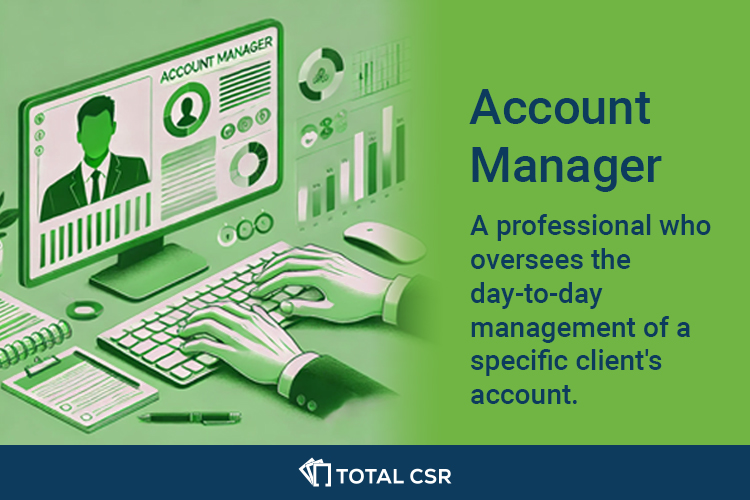Understanding the Role of an Insurance Account Manager

An insurance account manager, sometimes referred to as a CSR (insurance customer service representative), insurance account coordinator, or insurance relationship manager, plays a crucial role in maintaining strong client relationships and ensuring policyholders receive the service they need. Unlike producers who focus on acquiring new clients, account managers serve as the primary point of contact for existing accounts. They are responsible for policy servicing, client retention, and problem resolution, making them indispensable in both personal and commercial lines of insurance.
Insurance Account Manager Overview
In their role as account managers, they work closely with producers, underwriters, and clients to address coverage concerns and identify opportunities for additional protection. In a commercial insurance setting, account managers handle complex policies and provide tailored risk management solutions, often collaborating with insurance risk managers.
Core Responsibilities of the Role
- Client Relationship Management
Insurance account managers, also referred to as insurance client managers, maintain direct communication with clients, responding to inquiries, processing policy changes, and addressing coverage concerns. Their ability to build and maintain trust significantly impacts client retention. Effective customer relationship management and relationship building are essential for success in this role.
- Policy Servicing and Renewals
Managing renewals is a key duty. Account managers, whether in personal or commercial lines, proactively review policies to ensure they still meet clients’ needs. This may involve analyzing policy options, recommending adjustments, and negotiating terms with carriers to secure competitive rates. Personal lines account managers focus on individual clients, while commercial account managers may develop territory business plans for their corporate clients.
- Coverage Review and Risk Assessment
Beyond administrative tasks, insurance account managers help clients understand their coverage, ensuring they are adequately protected. They analyze exposures, explain policy details, and suggest additional coverages when needed. This role often overlaps with that of an insurance risk manager, especially when dealing with complex commercial accounts.
- Claims Support
When clients face a loss, account managers are on the front lines helping. They guide clients through the claims process, ensuring they understand the next steps and assist in communication with adjusters. Some agencies may have specialized insurance claims teams to handle this aspect of client service.
While producers focus on new sales, account managers identify gaps in coverage within existing accounts. By offering additional products through solution selling, they improve client protection and increase agency revenue. This approach to managing customer accounts contributes to the agency’s business development efforts. Insurance sales account managers may specialize in this aspect, focusing on improving sales performance through their selling experience.
- Documentation and Compliance
Maintaining accurate records is critical. Account managers update client files, process endorsements, and ensure all transactions comply with industry regulations.
Remote Insurance Account Manager Jobs Post COVID
With advancements in digital tools and agency management software, many insurance account managers now work remotely. They use cloud-based platforms to handle policy renewals, service accounts, and communicate with clients via phone, email, and video conferencing. Remote roles provide flexibility and access to a broader talent pool, making them an attractive option for both agencies and professionals seeking work-life balance.
Essential Skills for an Insurance Account Manager
Insurance professionals can apply these insights in various situations:
- Insurance Knowledge
A strong grasp of policy language, underwriting guidelines, and risk management principles is essential. Account managers must interpret policy documents and communicate coverage details clearly to clients. Understanding the competitive landscape is crucial for providing informed advice to clients. - Attention to Detail
Insurance policies involve numerous terms and conditions. A single oversight can lead to gaps in coverage or compliance issues, making precision a necessity for account managers and insurance account specialists alike. - Customer Service and Communication
Whether explaining policy nuances or resolving a billing issue, effective communication is a must. Insurance account managers should be adept at handling customer concerns with professionalism and patience. - Time Management and Organization
Balancing multiple client accounts requires strong time management skills. Insurance portfolio managers must prioritize tasks efficiently while ensuring all client requests are handled promptly. - Negotiation and Problem-Solving
Account managers work with both clients and carriers to find solutions that meet coverage needs while staying within budget. Strong negotiation skills help in securing better terms for clients, including favorable contractual pricing arrangements. - Business Acumen
Understanding the broader business implications of insurance decisions is crucial. Insurance account analysts use their business acumen to provide insights that help clients make informed choices about their coverage.
Career Path and Growth Opportunities
Insurance account managers typically start as insurance customer service representatives (CSRs) or assistants before advancing into account management roles. With experience, they can progress to senior account manager, insurance account supervisor, or agency operations manager positions. Some account managers transition into sales, underwriting, or risk management roles, leveraging their expertise in client service and policy analysis.
Insurance Account Executive vs. Insurance Account Manager
Though similar, these two roles have distinct responsibilities:
- Insurance Account Managers focus primarily on servicing existing accounts, managing renewals, and handling customer inquiries. They ensure policies meet clients’ needs and provide ongoing support.
- Insurance Account Executives often take on a more strategic role, working on business development, client acquisition, and high-level account management. They may oversee a portfolio of accounts and focus on expanding agency revenue through tailored insurance solutions.
Commercial Insurance Account Manager Salary
Salaries for commercial insurance account managers vary based on experience, location, and company size. The base pay range typically falls within these averages:
- Entry-Level: $50,000 – $65,000 per year
- Mid-Level: $65,000 – $85,000 per year
- Senior-Level: $85,000 – $100,000+ per year, often with performance-based bonuses
Highly experienced commercial account managers in large brokerages or specialized industries (e.g., construction, healthcare, or cyber insurance) may earn six figures. Corporate & specialty account managers or those working on strategic account teams may command higher salaries due to the complexity of their accounts.
Industry Certifications for Career Advancement
Earning professional designations can enhance credibility and career prospects. Common certifications include:
- Qualified Commercial Lines Specialist (QCLS)
- Qualified Personal Lines Specialist (QPLS)
- Qualified Employee Benefits Specialist (QEBS)
- Qualified Professional Insurance Specialist (QPIS)
- Professional Commercial Insurance Advisor (PCIA)
This article has outlined the main differences between occurrence and claims-made forms, including key aspects like policy period considerations and the importance of continuous coverage. Insurance professionals can use these insights to better assess coverage options, tailor risk management strategies, and advise clients with confidence. For further guidance or to review your current strategies, please contact our team for a detailed discussion on how understanding the difference between an occurrence vs claims made form can work for your organization. Whether you’re an insurance buyer looking for the right policy or an insurance broker seeking to provide the best advice, we’re here to help navigate the complexities of occurrence insurance and claims-made policies.
Common Challenges Faced in this Role
- Handling High Workloads
Juggling multiple accounts can be demanding, particularly during peak renewal seasons. Time management strategies and account management tools help streamline tasks. - Client Expectations and Difficult Conversations
Managing expectations is part of the job. Whether addressing premium increases or coverage limitations, account managers must deliver honest yet empathetic explanations. - Keeping Up with Regulatory Changes
Insurance regulations frequently evolve. Staying informed through continued education ensures compliance and better service to clients. - Meeting Sales Objectives
Many agencies set quota objectives for their account managers. Balancing client service with sales strategies and new account penetration can be challenging but is crucial for career growth.
How Insurance Agencies Can Support Account Managers
- Investing in Training and Technology
Providing access to learning resources and modern insurance management systems enhances efficiency and accuracy. This includes training on how to properly understand coverage terms and practical skills and process training. - Defining Clear Career Paths
Establishing structured career progression plans helps retain skilled account managers and motivates them to excel. This might include paths to an account executive or producer role, or specialization as an insurance underwriting account manager. - Encouraging Collaboration with Producers
Strong communication between producers and account managers improves client service and overall agency performance. This collaboration can lead to more effective sales call activity and improved service sales execution. - Promoting Specialization
Encouraging account managers to specialize enhances their value to the agency and clients. This could involve focusing on specific industries or becoming an expert in areas like cyber insurance or risk management.
Sample Job Description for an Insurance Account Manager
Job Title: Insurance Account Manager
Job Summary: We are seeking a detail-oriented and customer-focused Insurance Account Manager to manage and service client accounts effectively. The ideal candidate will have strong insurance knowledge, excellent communication skills, and the ability to handle policy servicing, renewals, claims support, and coverage recommendations
Key Responsibilities:
- Maintain and strengthen client relationships through proactive communication and support.
- Process policy changes, endorsements, renewals, and billing inquiries.
- Analyze client insurance needs and recommend appropriate coverage options.
- Assist clients with claims processes and advocate on their behalf with carriers.
- Identify opportunities for cross-selling additional coverages.
- Ensure compliance with industry regulations and agency procedures.
- Maintain accurate documentation of client interactions and policy transactions.
Qualifications:
- Experience in insurance account management or customer service in an agency setting.
- Strong knowledge of personal and/or commercial insurance policies and coverages.
- Excellent problem-solving and communication skills.
- Proficiency in insurance management software and Microsoft Office Suite.
- Insurance certifications such as QCLS, CPLS, QEBS, QPIS, PCIA are a plus.
Work Environment: This role involves direct client interaction via phone, email, and in-person meetings. It may also require collaboration with producers, underwriters, and claims representatives to ensure optimal client service.
Final Thoughts
The role of an insurance account manager is pivotal in delivering excellent client service, maintaining policy accuracy, and contributing to agency success. With opportunities in remote work, career advancement into executive roles, and growing salary potential in commercial lines, this profession offers a rewarding path for insurance professionals. As agencies continue adapting to industry changes, skilled account managers, including insurance broker account managers and those specializing in niche areas, will remain in high demand, ensuring policyholders receive expert guidance and support.


